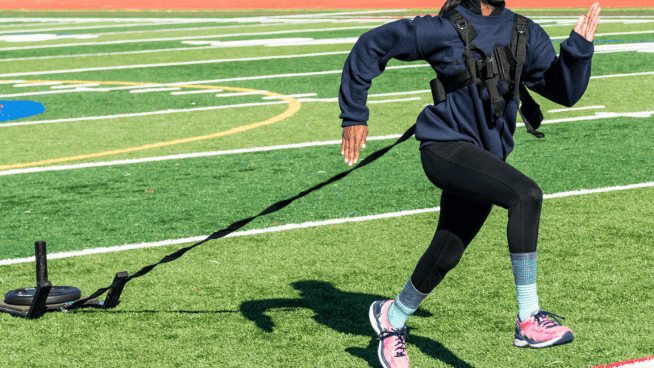Are You "Mr. Crunch Time" or a Post-Season Goat?
Are you “Mr. Crunch Time” or a post-season goat? Overthinking the moment can cause an athlete to miss opportunities to excel. Feeling and succumbing to pressure is a common problem among athletes and non-athletes.
Overcome pressure-packed situations by incorporating exercise and sport psychology into your routine, so your athletic movements become natural reflexes. Still not sold? Many professional athletes use exercise and sport psychology, even employing sports psychologists to help them get to the next level. Examples include snowboarding gold medalist Shaun White, NBA champion Ron Artest and NBA superstar LeBron James.
Here are some hints from sports psychology:
Take a breath
Inhale deeply and hold your breath for about four seconds, then exhale slowly; repeat. This will help you relax and regain control of your emotions so you can refocus your attention on what you have to do. (Try a circle-breathing exercise.)
Target your thoughts
Direct your thoughts on what you have to do, not the distractions. Focus only on what you need to accomplish, not on what might go wrong.
Practice your pre-game ritual
Develop a pre-performance routine to use on game day. Repetition through practice will help you dismiss thoughts of failure and execute when the pressure builds.
Prepare to perform
The less you prepare, the more anxious you’ll become. The more you practice, the better understanding you’ll have of what’s needed and the more confident you’ll feel when it’s time to perform.
If you feel pressure, embrace it
Elite performers view pressure as an opportunity to rise to another level. Visualize a time when you felt confident, and focus on that moment. Tell yourself that you will dominate!
Keep your eyes on the prize
Or the old cliché, “keep your eye on the ball.” Athletes who look directly at the target have more success than those whose eyes wander. When your eyes dart between other players, the field, the ball, the hoop or the goal, your brain has to take time to process all that information. Keep your eyes focused. Your hand-eye coordination will give your brain quicker feedback to execute efficiently.
Develop a catch phrase
When your goal is a personal best or you’re playing for a championship, your body has to physically perform better than it ever has. To rely on your training and keep doubts from sabotaging you, dial in the motivation to prime yourself for success. Maintain focus and push out negative thoughts by using focus words, or play a song in your head that inspires you. When it is time for the event, say these words or sing that song.
According to Sports Psychology author Leif H. Smith, “Cue words are simple words and phrases that remind you of your focus points. Copying words will remind you to focus on what you need to do. If your mind is focused on your cue words, your body will follow.”
Don’t hesitate
Don’t overthink the big moment. Giving yourself too much time to think about the process might cause you to change something in your well-practiced routine. Instead, depend on your muscle memory to execute your game plan, and strike earlier rather than later.
RECOMMENDED FOR YOU
MOST POPULAR
Are You "Mr. Crunch Time" or a Post-Season Goat?
Are you “Mr. Crunch Time” or a post-season goat? Overthinking the moment can cause an athlete to miss opportunities to excel. Feeling and succumbing to pressure is a common problem among athletes and non-athletes.
Overcome pressure-packed situations by incorporating exercise and sport psychology into your routine, so your athletic movements become natural reflexes. Still not sold? Many professional athletes use exercise and sport psychology, even employing sports psychologists to help them get to the next level. Examples include snowboarding gold medalist Shaun White, NBA champion Ron Artest and NBA superstar LeBron James.
Here are some hints from sports psychology:
Take a breath
Inhale deeply and hold your breath for about four seconds, then exhale slowly; repeat. This will help you relax and regain control of your emotions so you can refocus your attention on what you have to do. (Try a circle-breathing exercise.)
Target your thoughts
Direct your thoughts on what you have to do, not the distractions. Focus only on what you need to accomplish, not on what might go wrong.
Practice your pre-game ritual
Develop a pre-performance routine to use on game day. Repetition through practice will help you dismiss thoughts of failure and execute when the pressure builds.
Prepare to perform
The less you prepare, the more anxious you’ll become. The more you practice, the better understanding you’ll have of what’s needed and the more confident you’ll feel when it’s time to perform.
If you feel pressure, embrace it
Elite performers view pressure as an opportunity to rise to another level. Visualize a time when you felt confident, and focus on that moment. Tell yourself that you will dominate!
Keep your eyes on the prize
Or the old cliché, “keep your eye on the ball.” Athletes who look directly at the target have more success than those whose eyes wander. When your eyes dart between other players, the field, the ball, the hoop or the goal, your brain has to take time to process all that information. Keep your eyes focused. Your hand-eye coordination will give your brain quicker feedback to execute efficiently.
Develop a catch phrase
When your goal is a personal best or you’re playing for a championship, your body has to physically perform better than it ever has. To rely on your training and keep doubts from sabotaging you, dial in the motivation to prime yourself for success. Maintain focus and push out negative thoughts by using focus words, or play a song in your head that inspires you. When it is time for the event, say these words or sing that song.
According to Sports Psychology author Leif H. Smith, “Cue words are simple words and phrases that remind you of your focus points. Copying words will remind you to focus on what you need to do. If your mind is focused on your cue words, your body will follow.”
Don’t hesitate
Don’t overthink the big moment. Giving yourself too much time to think about the process might cause you to change something in your well-practiced routine. Instead, depend on your muscle memory to execute your game plan, and strike earlier rather than later.












